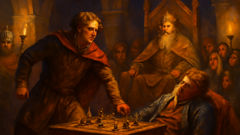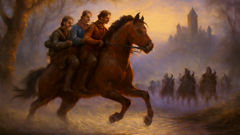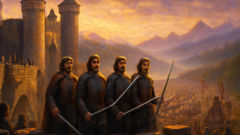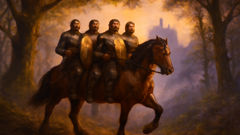Introduction
In the heart of medieval France, where dense forests cloaked secret paths and proud castles loomed above winding rivers, legends took root in the very soil. Of all these tales, none blazed brighter than that of the four sons of Duke Aymon: Renaud, Guichard, Allard, and Richard. Born in the rugged borderlands of Ardennes, the brothers were famed for their unmatched skill in arms and the deep, unbreakable bond that held them together through every trial. Their story is one of courage and rebellion—a desperate struggle against the most powerful monarch in Europe, Charlemagne himself. What began as a simple feud at the emperor’s court soon spiraled into a relentless hunt, where imperial pride clashed with fraternal loyalty, and where the legend of a magical steed—Bayard—would gallop through the mists of history. The sons of Aymon were not mere warriors; they were living testaments to the spirit of resistance, shaped by betrayal and loss, yet refusing to bow to tyranny. Guided by honor, haunted by guilt, and forever shadowed by the emperor’s wrath, they fled from Paris to the wilds of the Ardennes, carving out a tale that would echo through the centuries. In this world of chivalry, sorcery, and ceaseless adventure, the sons’ path was forged not just by swords and strength, but by the fierce love of family and the stubborn hope that justice would one day prevail.
The Court of Charlemagne and a Fatal Quarrel
In the days when the Frankish Empire was at its zenith, the court of Charlemagne shimmered with the brilliance of knights, scholars, and ambassadors from every corner of Europe. The emperor’s palace at Paris was a fortress of stone and discipline, its halls echoing with the clatter of armor and the low murmur of courtly intrigue. Into this world strode the four sons of Aymon—Renaud, the eldest and boldest; Guichard, clever and quick-witted; Allard, steady and just; and Richard, the youngest, whose laughter could dispel even the darkest mood. They had come to serve their king, to prove themselves in tournaments and battlefields, as their father had before them.

The brothers’ arrival caused a stir. Their reputation for valor preceded them, and Renaud especially drew the gaze of knights and ladies alike. His eyes shone with restless fire, and his hands never seemed far from his sword’s hilt. Yet even in this world of ambition, the sons of Aymon sought only to honor their house and find a place among the emperor’s chosen.
Trouble first brewed during the Feast of Pentecost, when the court gathered in celebration. Jousts thundered in the palace yard, while minstrels spun tales of old. Renaud, eager to test his mettle, challenged Berthelot, the emperor’s favorite nephew, to a friendly game of chess. The match drew a crowd, laughter rising as the pieces danced across the board. But jest turned to jeer as tempers flared. Berthelot, stung by defeat, mocked Renaud’s lineage. Words sharpened, pride flared, and in a moment of fury, Berthelot struck Renaud across the cheek. The court fell silent.
Renaud’s honor demanded satisfaction. A brawl erupted, and in the chaos, Renaud seized a heavy golden chessboard and struck Berthelot, felling him before the emperor’s throne. Blood pooled on marble. Charlemagne’s face hardened into stone as his nephew’s life ebbed away. The brothers, realizing the gravity of what had occurred, stood frozen in horror. The emperor’s command was swift and cold: Renaud and his brothers were now outlaws, guilty of noble bloodshed and treason.
The great hall emptied in a storm of fear. Aymon’s sons fled, their hearts pounding with dread and guilt. As they raced through shadowed corridors, their father, Duke Aymon, intercepted them. He was torn between loyalty to Charlemagne and love for his sons. But blood proved thicker than allegiance: he urged them to escape Paris before the emperor’s wrath fell upon their heads.
That night, while Charlemagne’s knights scoured the city, the four brothers vanished into the labyrinthine alleys of Paris. Their only hope lay in the ancient forests beyond the Seine—the wild and whispering Ardennes, where few dared to tread and legends lived beside wolves.
The Flight to Ardennes: Bayard’s Miracle
The brothers pressed north through moonlit fields and tangled woods, ever watchful for the thunder of pursuit. With every dawn, the empire’s net drew tighter. Charlemagne’s banners fluttered across France; his messengers demanded the traitors’ heads. Renaud led his brothers onward, haunted by guilt but driven by a stubborn hope that somewhere they might find sanctuary.

Their salvation came not from cunning, but from legend. As they reached the river Meuse, cornered by imperial soldiers, a miracle appeared: Bayard, a horse of mythic size and strength, emerged from the mists. It was said Bayard had been a gift from the wizard Maugis—Renaud’s cousin, rumored to possess powers unknown. The steed’s eyes shone with otherworldly intelligence. Without hesitation, the four brothers mounted Bayard, and to the amazement of friend and foe alike, the mighty horse bore all four upon his back as if they weighed nothing at all.
Bayard raced through river and woodland, outpacing every pursuer. The brothers clung tight as branches whipped past and hoofbeats drummed like thunder. In the Ardennes, where trees grew thick and fog laced the ground, they found Maugis waiting. The wizard welcomed them into his forest stronghold, cloaked in enchantments that kept Charlemagne’s armies at bay.
Here, among the ancient oaks and mossy stones, the sons of Aymon became legends. They built a hidden castle—Montessor—on a rocky outcrop above the river Meuse, its walls nearly invisible beneath ivy and mist. The people of the forest rallied to their cause, peasants and outlaws alike finding hope in the defiance of Charlemagne. Each day brought new skirmishes: imperial patrols were routed, and the name of Renaud became a rallying cry for the oppressed.
Yet life in exile was never easy. The brothers often went hungry, and the weight of Berthelot’s death haunted them. Renaud struggled with remorse, even as his sword arm grew ever more formidable. Guichard plotted clever raids; Allard kept the peace among their ragtag followers; Richard’s humor lifted spirits around evening fires. Maugis counseled them in secret arts and watched the stars for omens. Over time, Bayard became more than a mount—he was their symbol, a living miracle that gave hope when despair threatened to consume them.
Charlemagne’s fury only deepened. He laid siege to Montessor with all the might of his empire, but Bayard’s magic and Maugis’s cunning kept the brothers safe, at least for a time. The Ardennes, wild and mysterious, became both their fortress and their prison.
Siege and Sorcery: Defiance at Montessor
Montessor, the brothers’ hidden fortress, soon became the focus of Charlemagne’s rage. The emperor was unaccustomed to defiance, and every story of the brothers’ escape deepened his obsession. He marshaled armies and surrounded the forest, vowing to starve out Aymon’s sons or crush them beneath his banners. The siege began with the blare of warhorns and the grinding advance of siege towers.

Inside Montessor, the four brothers rallied their followers—hunters, woodsmen, even former knights who’d turned against imperial injustice. The castle’s walls bristled with archers. Supplies dwindled, yet spirits burned bright. Maugis conjured illusions that misled enemy scouts and wove wards to strengthen battered gates. Bayard, ever faithful, patrolled the woods at night, scattering spies and carrying messages through secret paths.
The siege dragged on for months. Hunger gnawed at defenders and attackers alike. Renaud led daring sorties, breaking enemy lines with swift cavalry charges. Guichard’s traps turned the forest into a nightmare for invaders: pits disguised by moss, boulders rolling from ridges, the sudden snap of arrows from shadowed boughs. Allard tended the wounded; Richard’s laughter echoed through dank halls even as hope sometimes faltered.
Yet the emperor would not yield. He called upon bishops to excommunicate the brothers. Priests thundered from pulpits that Renaud and his kin were cursed by God. The people of France whispered divided prayers—some for the emperor’s justice, others for the sons’ freedom. Through it all, Aymon, their father, pleaded for mercy at court, but Charlemagne’s heart remained unmoved.
One night, as thunder rolled over the forest and torches flickered below the walls, Maugis gathered the brothers in a stone chamber deep beneath Montessor. He spoke of fate and sacrifice—that magic could only shield them for so long. If they wished to survive, they would need not only courage but humility. In that moment, Renaud resolved to seek peace, not just for himself, but for his family and the countless innocents caught in the crossfire.
The next dawn, as arrows darkened the sky and the siege raged on, Renaud rode forth alone to parley with Charlemagne. The emperor demanded unconditional surrender and the surrender of Bayard—an impossible price. Renaud refused to betray his brothers or his loyal steed. With heavy heart, he returned to Montessor, knowing that battle or betrayal would soon decide their fate.
Conclusion
The siege of Montessor could not last forever. Exhausted by war and persuaded by his counselors—and by Aymon's desperate pleas—Charlemagne at last offered clemency: if Renaud surrendered Bayard and accepted exile, he and his brothers would be spared. It was a bitter bargain. Bayard, who had carried them through every trial, was to be drowned in the Meuse as a sacrifice to imperial pride. Renaud wept as he handed his beloved steed to Charlemagne’s men, but Bayard’s loyalty proved deeper than magic; legend claims he escaped, vanishing into the wild forever.
The brothers’ exile was long and harsh. Renaud wandered as a penitent knight, building bridges and churches for the poor in distant lands. Guichard, Allard, and Richard faded into quieter lives, ever loyal to one another and their father’s house. Time transformed their suffering into legend. The people remembered not just their defiance but their humanity—their willingness to pay any price for love, justice, and brotherhood.
So the legend of the Four Sons of Aymon endures: a tale not only of rebellion and adventure, but of the courage it takes to stand together when the world turns against you. In every whisper of wind through the Ardennes, in every hoofbeat on ancient stones, echoes their story—a story that belongs not just to France, but to all who believe in the power of family and hope.













